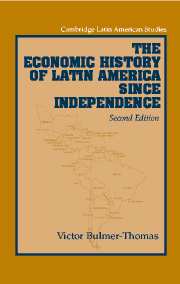Book contents
- Frontmatter
- Contents
- List of tables, figures, and maps
- Preface to the second edition
- Preface
- List of abbreviations
- 1 Latin American economic development: an overview
- 2 The struggle for national identity from independence to midcentury
- 3 The export sector and the world economy, circa 1850–1914
- 4 Export-led growth: the supply side
- 5 Export-led growth and the nonexport economy
- 6 The First World War and its aftermath
- 7 Policy, performance, and structural change in the 1930s
- 8 War and the new international economic order
- 9 Inward-looking development in the postwar period
- 10 New trade strategies and debt-led growth
- 11 Debt, adjustment, and the shift to a new paradigm
- 12 Conclusions
- Appendix 1 Data sources for population and exports before 1914
- Appendix 2 The ratio of exports to gross domestic product, the purchasing power of exports, and the volume of exports, circa 1850 to circa 1912
- Appendix 3 Gross domestic product per head, 1913, 1928, 1980, and 2000
- Bibliography
- Index
- CAMBRIDGE LATIN AMERICAN STUDIES
12 - Conclusions
Published online by Cambridge University Press: 05 June 2012
- Frontmatter
- Contents
- List of tables, figures, and maps
- Preface to the second edition
- Preface
- List of abbreviations
- 1 Latin American economic development: an overview
- 2 The struggle for national identity from independence to midcentury
- 3 The export sector and the world economy, circa 1850–1914
- 4 Export-led growth: the supply side
- 5 Export-led growth and the nonexport economy
- 6 The First World War and its aftermath
- 7 Policy, performance, and structural change in the 1930s
- 8 War and the new international economic order
- 9 Inward-looking development in the postwar period
- 10 New trade strategies and debt-led growth
- 11 Debt, adjustment, and the shift to a new paradigm
- 12 Conclusions
- Appendix 1 Data sources for population and exports before 1914
- Appendix 2 The ratio of exports to gross domestic product, the purchasing power of exports, and the volume of exports, circa 1850 to circa 1912
- Appendix 3 Gross domestic product per head, 1913, 1928, 1980, and 2000
- Bibliography
- Index
- CAMBRIDGE LATIN AMERICAN STUDIES
Summary
The economic development of Latin America since independence is a story of unfulfilled promise. Despite the abundance of natural resources and a favorable ratio of land to labor, and after nearly two centuries of freedom from colonial rule, not one republic has achieved the status of a developed country. Furthermore, the gap between living standards in Latin America and those in the developed countries has steadily widened since the early nineteenth century, when – by some accounts – the subcontinent was the most prosperous of the developing-country regions.
Even though the collapse of Iberian rule ended restrictions on commerce, Latin America continued to operate in a world in which rules were made by others. Unable to break into the charmed circle of advanced capitalist countries, Latin America has remained a peripheral region in which external influence has been preeminent. Trade cycles, investment and consumption patterns, the accumulation of debt, and the transfer of technology have all been driven by forces over which Latin America has exercised little control. Even during the period of inward-looking development, the ability of external events to shape internal dynamics was powerful.
Peripheral status has often been used to explain Latin American backwardness. Other countries faced the same constraints, however, and still managed to transform their position while abiding by the rules of the game.
- Type
- Chapter
- Information
- The Economic History of Latin America since Independence , pp. 392 - 410Publisher: Cambridge University PressPrint publication year: 2003



